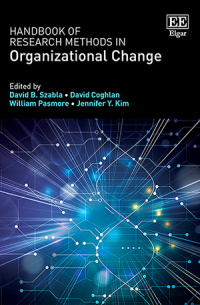
Hardback
Research Handbook on Artificial Intelligence and Decision Making in Organizations
Featuring state-of-the-art research from leading academics in technology and organization studies, this timely Research Handbook provides a comprehensive overview of how AI becomes embedded in decision making in organizations, from the initial considerations when implementing AI to the use of such solutions in strategic decision making.
More Information
Critical Acclaim
Contributors
More Information
Featuring state-of-the-art research from leading academics in technology and organization studies, this timely Research Handbook provides a comprehensive overview of how AI becomes embedded in decision making in organizations, from the initial considerations when implementing AI to the use of such solutions in strategic decision making.
结合cutting-edge scholarship on the many issues and complexities surrounding the use of AI in decision making for organizations, this enlightening Research Handbook illustrates how technology is intertwined with organizational processes and outcomes. Contributors examine human-AI collaboration in welfare services, responsible AI governance, AI systems in medical imaging, and the ethical implications of AI use in practice. Furthermore, the editors propose an integrative framework for decision making in organizations that encompasses making decisions about AI, with AI, and the implications of decisions made by AI.
The Research Handbook will be essential reading for students, academics and researchers in business analytics, information systems, organizational innovation, organizational behavior, and organizational and occupational psychology. It will also be a valuable resource for business managers and AI engineers.
结合cutting-edge scholarship on the many issues and complexities surrounding the use of AI in decision making for organizations, this enlightening Research Handbook illustrates how technology is intertwined with organizational processes and outcomes. Contributors examine human-AI collaboration in welfare services, responsible AI governance, AI systems in medical imaging, and the ethical implications of AI use in practice. Furthermore, the editors propose an integrative framework for decision making in organizations that encompasses making decisions about AI, with AI, and the implications of decisions made by AI.
The Research Handbook will be essential reading for students, academics and researchers in business analytics, information systems, organizational innovation, organizational behavior, and organizational and occupational psychology. It will also be a valuable resource for business managers and AI engineers.
Critical Acclaim
‘The recent dawning of a new AI era raises many management questions. There is much work to do to answer these questions, and this book offers vital early thinking that can help researchers and managers move toward a better understanding of AI and the challenges it presents.’
– Robert D. Austin, Ivey Business School, Western University, Canada
‘This timely Research Handbook is a compelling call for rethinking the meaning of rationality in decision-making in the era of AI. A must have if one wants to navigate the unchartered waters of AI and decision-making in the years to come.’
– Paolo Quattrone, University of Manchester, UK
– Robert D. Austin, Ivey Business School, Western University, Canada
‘This timely Research Handbook is a compelling call for rethinking the meaning of rationality in decision-making in the era of AI. A must have if one wants to navigate the unchartered waters of AI and decision-making in the years to come.’
– Paolo Quattrone, University of Manchester, UK
Contributors
Contributors include: Margunn Aanestad, Angela Aristidou, Benedikt Berger, Jonna Bornemark, Adrian Bumann, Panos Constantinides, Ioanna Constantiou, Antonio Cordella, Camille G. Endacott, Robert D. Galliers, Francesco Gualdi, Gunnar Holmberg, Jonny Holmström, Marleen Huysman, Lena Hylving, Sirkka L. Jarvenpaa, Mayur P. Joshi, Stefan Klein, Dina Koutsikouri, Angelos Kostis, Nicolette Lakemond, Paul M. Leonardi, Susanne Lindberg, Jingyao (Lydia) Li, Yulia Litvinova, Marco Marabelli, Attila Márton, Anne-Sophie Mayer, Nikolay Mehandjiev, Patrick Mikalef, Miriam Möllers, Alex Murray, Sue Newell, Stella Pachidi, Ilias Pappas, Elena Parmiggiani, Jen Rhymer, Andrew Sarta, Arisa Shollo, David Sirmon, Marta Stelmaszak, Franz Strich, Leif Sundberg, Mike H.M. Teodorescu, Bijona Troqe, Polyxeni Vassilakopoulou, Lauren Waardenburg, Tiantian Xian




